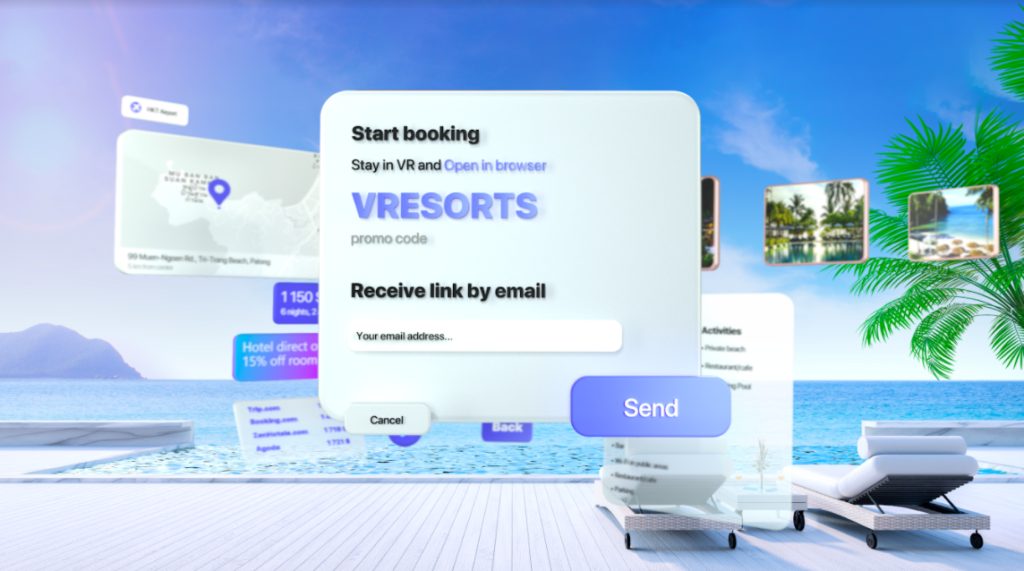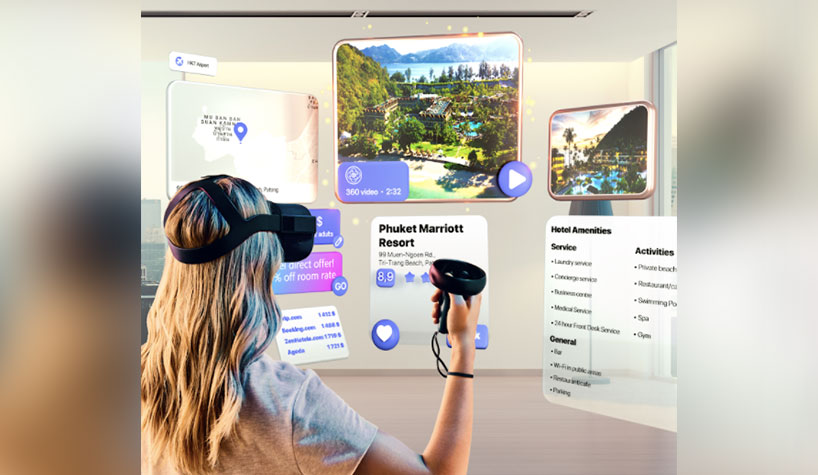SINGAPORE—VResorts, a VR commerce and VR content innovator, based here, serves resorts and hotels globally with its virtual reality solutions. The company has just launched its Virtual Reality Booking Platform, allowing travelers to choose their destinations and purchase their vacations within the virtual reality space.
“We have designed our booking engine to be quite similar to regular online booking platforms in terms of the steps, but at the same time it is very different in terms of experience,” said Vladimir Varnavskii, founder/CEO, VResorts. “We really wanted to immerse guests into our interface, allowing them to browse hotels with a relevant immersive background of the location they are searching. We allow the customer to explore the hotel almost as if a hotel manager is walking with you, giving you a tour and telling you a story. That is an important part here; storytelling in VR is the key to creating these immersive experiences that people are looking for and enjoying the most.”
It’s straightforward: the user downloads the app onto his or her VR device and will then have the ability to browse for hotels by location and date and view live deals.

“These deals and prices are exactly the same as you would find on online travel agencies such as Booking.com or Expedia.com,” Varnavskii explained. “The hotels that have VR content are featured and curated for the guests to browse and experience VR videos and 360-degree shots of the hotel, which are very impressive when displayed through the VR headset. If the hotel does not have such VR content, people can scroll through static pictures of the property the same way as you would on a regular online browser.”
The customer has the option of checking out using the VR headset browser and is linked to the payment page, or, they can use their email and a booking link will be sent directly to them.
Varnavskii has seen the steady rise of VR—mainly due to the development of VR gaming—and believes the next iteration will be people buying and selling products on a VR platform.
“I have worked with one of the biggest hospitality startups as a managing director and during this time I was really able to understand the needs and wants of the hotels industry by connecting closely with management of a huge variety of different hotels globally,” Varnavskii recalled. “On the other hand, I experienced VR for the first time being shown natural parks and nature reserves in VR, and this really triggered a recognition that there is a huge potential in VR.”
Especially now, having VR available is quite possibly the closest way guests can experience the joy of traveling and staying at a hotel.
“In terms of satisfaction for customers, there just is no other way you can explore and experience hotels other than in VR, without actually having to be there in person,” Varnavskii said. “This technology allows for guests to be teleported to the hotel to check out everything they want to know and give them the confidence to book right away.”
Booking without VR comes with its own host of hurdles, the CEO explained, like guests seeing photos that misrepresent the property and not being able to try before you buy.
“From a hotel perspective, it’s a completely new sales channel, which in itself is unique in this day and age,” Varnavskii said. “Not only that, it is also a very good chance to convey to customers what you have invested in to better their overall booking experience and start to give them a taste of how much the hotel has to offer and what kind of special services they may have available for their guests. Connecting with your guests even before they arrive is a very important way to stay ahead of the competition these days.”
Especially post-COVID, guests are choosing hotels precisely and carefully, and being able to truly experience a property from the comfort of their own homes can make all the difference.
“We actually did a research project where we found that around 50% of guests who are looking for $500+ a night hotels are eager and willing to invest $300-400 to buy a VR device just to make sure that they make the right hotel choice using our technology and content,” Varnavskii said.
The CEO believes that VR will continue to grow, even into retail, but that there needs to be established trust between the business and customer to fully explore VR commerce.
“Creating selling experiences such as our hotel booking engine is a fantastic use case because the value-added compared to using smartphone apps or your laptop is significant; you are essentially traveling to the place in VR before purchasing the real-life experience,” Varnavskii said. “We believe that by releasing VResorts booking platform we are giving a push for global e-commerce to try take its first steps into the VR-commerce world.”

